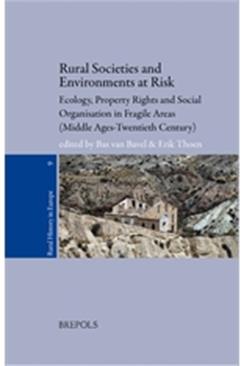Publications | Rural History in Europe
Rural societies and environments at risk. Ecology, property rights and social organisation in fragile areas (Middle Ages-Twentieth century)
This book discusses the relationship between ecology and rural society in fragile environments from the Middle Ages until the 20th century, and questions how societies organised land use by property rights.
This book discusses the relationship between ecology and rural society in fragile environments of the past. Rural land use in these areas entailed an inherent vulnerability, for instance because of their poor soils, aridity or their location in mountain areas, near the sea or in severe climatic conditions. The various chapters analyse how societies coped with this vulnerability by way of the organization of property rights to land. These rights formed the framework which shaped the use of the land and were a main constituent of the relationship between mankind and ecology in these fragile areas. To a large extent, therefore, they determined – and still determine - the success or failure of rural societies to cope with the challenges posed by their environment. In their turn, however, these property rights were shaped within a wider social and political context, in which political and ideological considerations, and special interests, also played their part. As a result, the organization of these rights was not always geared towards sustainability, as demonstrated in these chapters, which discuss and analyse long-term developments in several parts of Northwestern, Central and Southern Europe.
Bas van Bavel is professor of economic and social history of the Middle Ages, head of the section of Economic and Social History, and coordinator of the knowledge centre Institutions of the Open Society at Utrecht University (the Netherlands).
Erik Thoen is ordinary professor at Ghent University (Belgium) specialised in rural and environmental history. He is co-ordinator of the CORN history network (Comparative Rural History of the North Sea Area).
LIST OF CONTRIBUTORS
Bas VAN BAVEL, Utrecht University, Netherlands
Piet VAN CRUYNINGEN, Wageningen University, Netherlands
Peder DAM, Copenhagen University, Denmark
Inaki IRIARTE-GONI, University of Zaragoza, Spain,
Mats MORELL, Stockholm University, Sweden
Sylvain OLIVIER, University of Caen, France
Maria José Roxon, Nova University of Lisbon, Portugal
Rui SANTOS, Nova University of Lisbon, Portugal
Tim SOENS, University of Antwerp, Belgium
Erik THOEN, Ghent University, Belgium
Andras VÀRI (†), Miskolc University, Hungary
Nadine VIVIER, University of Maine, France
Angus J. L. WINCHESTER, Lancaster University, United Kingdom
 Actualités
Actualités
Les intermédiaires dans la relation de travail dans les sociétés esclavagistes et post-esclavagistes, XVe siècle à nos jours
 Appel à communication - Samedi 1 mars 2025 - 18:00ArgumentaireDans la vaste question du travail contraint et forcé, les intermédiaires, placés à l’intersection des statuts de libre, d’esclave ou d’engagé, jouent un rôle central, quoique relativement négligé par l’historiographie. Ce numéro 'Esclavages & post~esclavages / Slaveries & Post~Slaveries (n°13, 2026, CIRESC), dirigé par Alessandro Stanziani (GRHEN), propose d’exposer leurs situations dans le long terme, du moment de la traite à cel(...)
Appel à communication - Samedi 1 mars 2025 - 18:00ArgumentaireDans la vaste question du travail contraint et forcé, les intermédiaires, placés à l’intersection des statuts de libre, d’esclave ou d’engagé, jouent un rôle central, quoique relativement négligé par l’historiographie. Ce numéro 'Esclavages & post~esclavages / Slaveries & Post~Slaveries (n°13, 2026, CIRESC), dirigé par Alessandro Stanziani (GRHEN), propose d’exposer leurs situations dans le long terme, du moment de la traite à cel(...)
Hugo Souza de Cursi, lauréat de la bourse d'aide à publication de l'IDA 2024
Prix et distinctions -L’ appel à publication de thèses lancé par l’Institut des Amériques (IDA) a vocation, chaque année, à attribuer une aide financière à de jeunes docteurs en sciences humaines et sociales dans le cadre de projets de publication de leur thèse. Les thèses récompensées abordent des thématiques en lien avec les Amériques.Parmi les trois projets retenus dans le cadre de l’appel lancé par l’IDA pour l’année 2024, et soumis à l’acceptation définitive des Presses universitaires d(...)
Prix de la pensée européenne 2024
Prix et distinctions -Le premier prix de la pensée européenne, créé par des intellectuels engagés, a été remis le 16 mars 2024 à Conques, dans l’Aveyron. L’objectif est de promouvoir un idéal démocratique européen qui réponde aux enjeux environnementaux et sociaux du monde.Associé à un colloque de fond "Le réveil de la pensée européenne ?" qui sest déroulé les 16 et 17 mars au Centre européen de Conques (retransmis en direct avec Philosophie Magazine), et présidé par le philosophe Dominique(...)
ERHIMOR
EHESS-CRH
54 boulevard Raspail
75006 Paris
Tél. : +33 (0)1 49 54 24 42
ou : +33 (0)1 49 54 25 74
Fax : +33(0)1 49 54 23 99
Dernière modification :
18/04/2018



